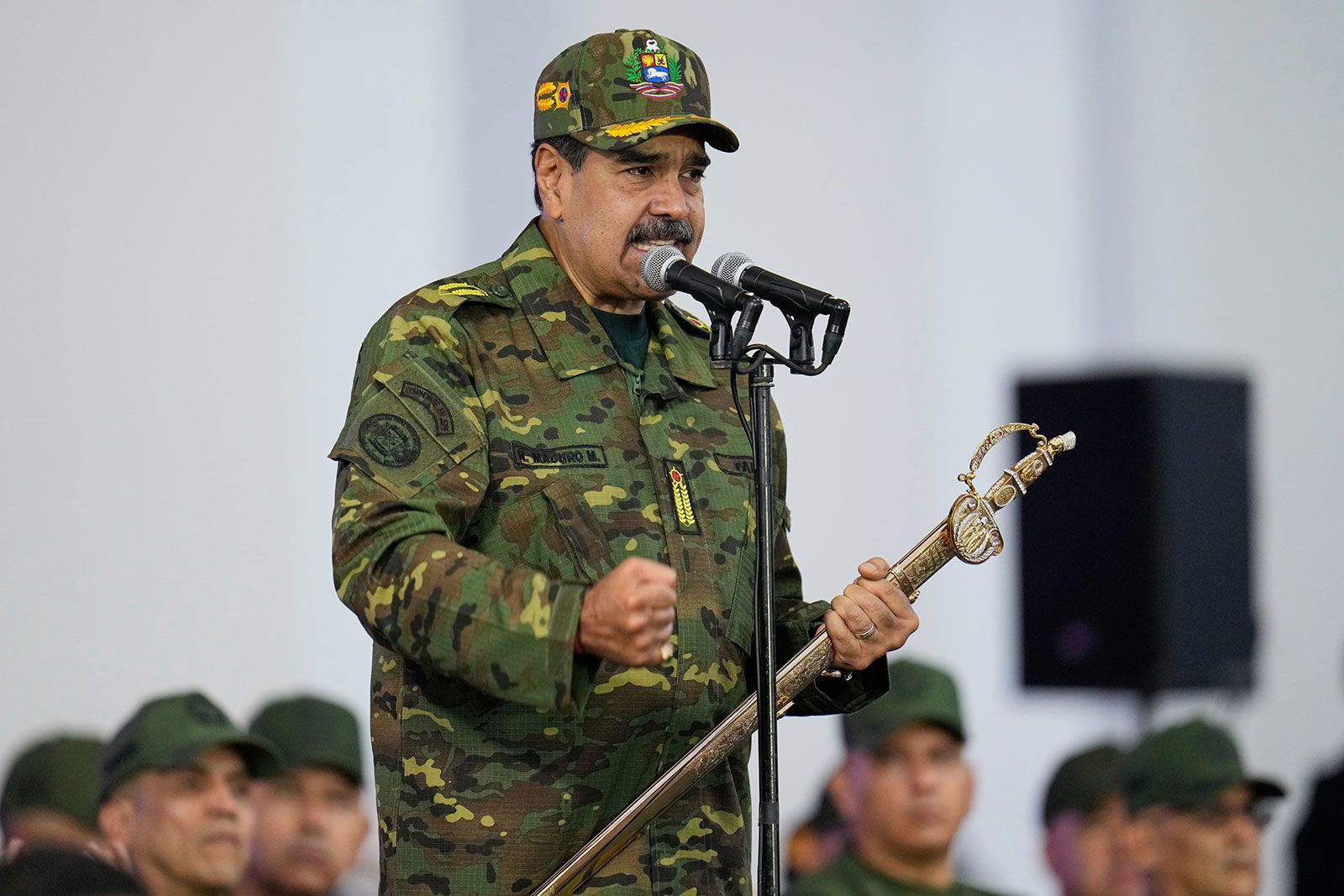Maduro ramps up repression in Venezuela as he faces growing threats abroad

Venezuelan President Nicolas Maduro grasps a sword during a government-organized civic-military rally in Caracas
By CNN staff
(CNN) — Venezuela is entering one of its most repressive periods in years, rights monitors say, as President Nicolás Maduro faces mounting isolation and an expanding US military presence in the Caribbean.
According to the Venezuela human rights group Provea, October saw the highest level of repression since the start of the bilateral tensions, with 54 detentions of people, many of whom linked to opposition leader María Corina Machado.
“This is a policy designed to instill fear among Venezuelans,” said Marino Alvarado, the NGO’s coordinator, who warned about worsening prison conditions, overcrowding, and punishments against political detainees.
The human rights committee of the opposition movement Vente Venezuela told CNN that 2025 has marked a shift from mass crackdowns to “surgical” targeted ones.
Orlando Moreno, who leads the committee, said the government is using political kidnappings and selective detentions to “decapitate opposition leadership” — a strategy he warned could intensify if the military standoff with the United States escalates.
“Now the goal isn’t to fill prisons; it’s to neutralize organizing power by removing voices that can mobilize people,” Moreno said. “The law is being used as a political weapon.”
Vente Venezuela reports that in 2025 there has been one arbitrary detention every 32 hours, with 232 documented cases so far — 143 involving members of their movement. In 2024, the average was six arrests a day, totaling 2,500. Both groups agree October was the most repressive month, coinciding with Machado receiving the Nobel Peace Prize and a spike in US pressure on Maduro.
Moreno said at least seven military officers, including a division general, were recently detained, though CNN could not independently verify these arrests. He claims some officers were targeted after refusing to record loyalty videos for Maduro. He also accused the government of “hostage diplomacy,” using political detainees — Venezuelan and foreign — as bargaining chips.
He added that reports of torture, isolation, and inhumane conditions continue across detention centers, despite appeals from the UN Fact-Finding Mission, which has documented ongoing cases of torture and due-process violations.
The Venezuelan government has previously insisted that detainees’ human rights and due process are respected and has dismissed international reports on arbitrary detentions as “interventionist,” calling the allegations “irresponsible, biased, and deeply polarized.”
A sequence of family disappearances
The case of the Hernández Castillo family is emblematic of this climate of repression in Venezuela, with several family members reportedly taken and held without due process.
On November 19, men wearing metro uniforms — some identifying themselves as Bolivarian National Police officers, others as members of the Organized Crime Division, and some without identification — forcibly entered the home of 16-year-old Samanta Sofía Hernández Castillo at night in western Caracas.
According to relatives, who reported the incident to the NGO Committee for the Freedom of Political Prisoners, the men threatened her grandparents with firearms before taking the teenager without explaining where or why. Her family still has no information about her whereabouts.
“I hold Diosdado Cabello, the Minister of Interior and Justice, responsible for the persecution our family is facing,” said Samanta’s mother, Ámbar Castillo, in a video posted on social media. She expressed concern for her daughter’s physical and emotional safety, calling the incident a “kidnapping.”
Two days later, the family learned that Samanta’s 19-year-old sister, Aranza, had also been detained in Maracaibo. Their mother said she has visited multiple detention centers after receiving informal tips, but authorities denied the girls are being held in those locations.
Both young women are sisters of Lieutenant Cristian Hernández, who fled the country after saying he was being persecuted on conspiracy charges. Cristian’s wife, Maykelis Borges, was also detained and gave birth at a women’s prison, and remains held along with her newborn. According to Foro Penal, she was arrested while pregnant on January 29, 2025, and charged with conspiracy along with her husband. Her family says she was denied a private lawyer and assigned a public defender.
The pressure on the family began even earlier: the girls’ uncle, agricultural producer Henry Castillo, was also taken on January 24 for reasons the family says are unclear. They consider him a victim of enforced disappearance.
CNN contacted the Public Prosecutor’s Office for comment and is awaiting a response.
Harsh sentencing raises alarm
The Hernández Castillo case is not isolated. On November 16, Dr. Marggie Orozco, 65, was sentenced to 30 years in prison — the maximum penalty under Venezuelan law — on charges of treason, incitement to hatred, and conspiracy.
According to Provea and relatives, it all followed an audio message she shared, urging people to vote in the 2024 presidential elections.
CNN does not have access to the message, but her son, Walter Ruiz, said his mother wanted to “achieve change in the country.” He said a neighbor, who is also a local government representative, reported her, and police arrested her without a warrant the night of August 5, 2024.
Provea says such “disproportionate” sentences show how the justice system is weaponized against political targets. Alvarado noted a brief dip in arrests in early November — an apparent attempt by the government to signal openness to dialogue with Washington — but added that such lulls are short-lived. A few detainees, including French citizen Camilo Castro and Venezuelan businessman Noel Álvarez, were released during that period.
CNN contacted the Ministry of Interior, Justice and Peace and the Attorney General’s Office for comment on the cases mentioned in this story but has not received a response.
Meanwhile, Venezuelans continue to navigate pressure on two fronts — internal and external — amid deep uncertainty about the country’s future.
The-CNN-Wire
™ & © 2025 Cable News Network, Inc., a Warner Bros. Discovery Company. All rights reserved.



